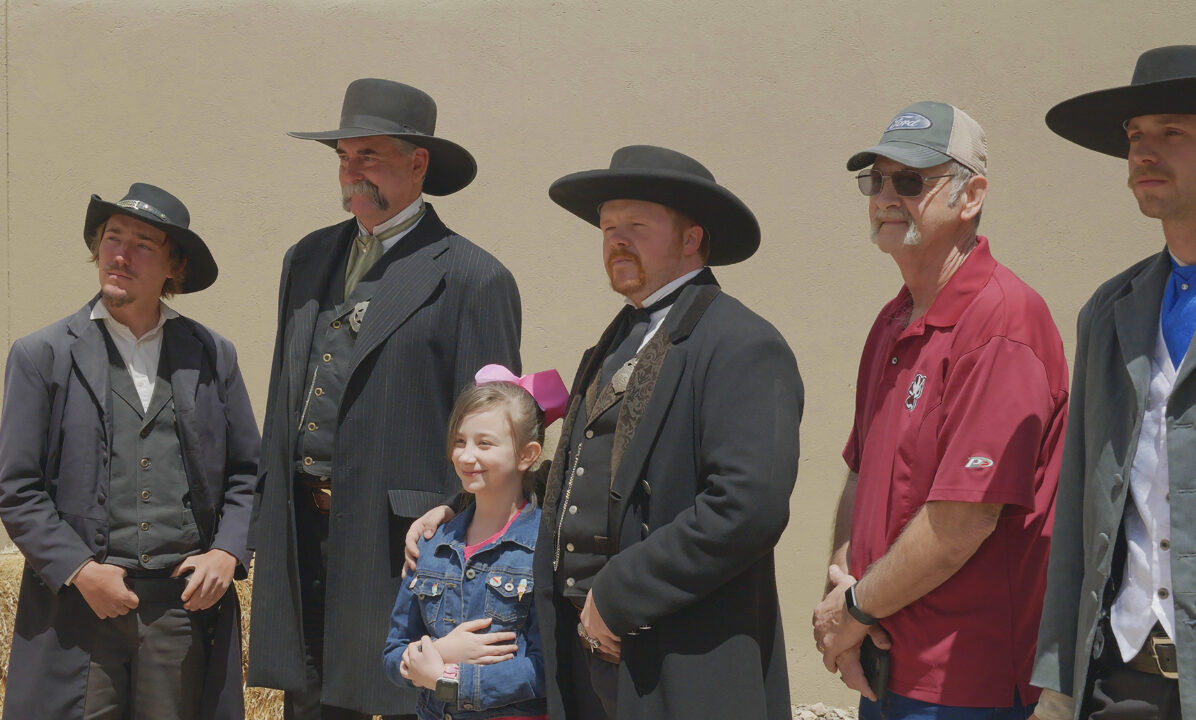“I was really fascinated by Fonda as a teenager”: Alexander Horwath on Henry Fonda for President at Berlinale 2024

Alexander Horwath’s Henry Fonda for President is an immersive, idiosyncratic documentary that proves to be gently riveting, even if its synopsis might suggest otherwise. After all, this is a three-hour film that the Berlin Film Festival has helpfully described as an “autobiofilmographical monument”. Using the disconnection between Fonda’s everyman public persona and a more cynical private persona, Horwath uses the actor’s filmography to paint a picture of the United States as it is, and how it could be. We sat down with the first-time director at the 2024 Berlinale for a fascinating chat about his documentary.
Your film premieres here at the festival, in the historic Delphi Theatre in Berlin. Are you excited?
I’m a very old first-time filmmaker, I’m 59, so my first time at the Berlinale was when I was 20 in 85, and I think half of my screenings were at the Delphi then. I watched Queen Kelly (1932) – the Stroheim restoration, it was shown for the first time restored, and I saw Robert Kramer’s films and Iosseliani’s Les Favoris de la lune (1984), and I spent so much time at the Delphi, so honestly it feels very good and warm that my own film will have its premiere there. It’s a cinema that I like very much.
Do you plan to watch the film with an audience, or is that too much pressure for a debut director?
That’s a good question, because I thought that this is not usually done. All my filmmaker friends, Ruth Beckermann and everybody has said – of course you do. You want to, you need to feel – and maybe I thought one is much too nervous, every person who leaves the theatre (during the screening) would feel like a personal attack! So I guess I will stay there with the two friends that I made this film with, and the producers, and yeah, I guess so. But you never know – if I become too shaky, and I’m a smoker too, so I might have a break – a smoking break in between, but I do plan to stay.
As we see in the movie, your interest in Fonda dates all the way back to 1980. Now that you’ve made the film, it seems like it was something that kept on growing throughout the years – like an itch that could only be scratched by making this documentary?
As a psychoanalytical way of looking at it, it could actually be that. The more practical thing was, as I say in the film, I was really fascinated by Fonda as a teenager, and there were long periods where I got into other aspects of cinema. I ran the Vienna Film Festival, I was a writer, a critic, I ran the Austrian Film Museum for 16 years. But in the last months of 2017, the last month I programmed at the film museum, one of the largest film series of that month was already called Henry Fonda for President, and it was a selection of 20 of Fonda’s films. What does this tell me? I did want to end this long period with, again, focussing on that, for me, that very special actor. But also, on acting as such; acting as a potentially authorial activity. That’s one of the theses of the film.
The authorial activity of actors?
I’m sure many people will see it differently, but over my curatorial work, we presented shows on Peter Lorre, Robert Mitchum, on Jean-Pierre Léaud and on Henry Fonda in the very last month. I do believe that certain actors in their oeuvre, in their work, have developed something like a narrative of their times, or of their nation. We did a show called Actor/Auteur, where it was really about what sort of authorship might there be in certain actor’s work. Kinuyo Tanaka – very few people knew her at the time, now her own films are being shown more, because of the wave of rediscovering female filmmakers, but Kinuyo Tanaka was the leading actress in Mizoguchi’s films over two decades, and she was always seen as the tool in Mizoguchi’s great masterly hands, and she was one of the actresses that we selected for this Actor/Auteur show, because she – beyond Mizoguchi’s own authorship, she and her acting were an essential part of the narrative that was told in these films, and she became a filmmaker herself, later on, so we also showed her directorial work, so why not look at the works of great Japanese masters or American masters – not only as an Alfred Hitchcock, a John Ford, a Kenji Mizoguchi film since especially entertainment cinema, narrative cinema, industrial cinema is done in a way that there are so many crafts involved, so many types of creative activity involved.
Other than acting…
My own path towards cinema was always also through actors. Other people leave that viewpoint behind and say, “Oh, that’s a childish viewpoint.” At first, when we’re ten years old, or 12 years old, we identify the creative force of a film with its actors. Later on, we realise there are people behind the camera, and the actual authors of the films are people named Howard Hawk, and Alexander Kluge, and so on. I think it makes no sense to jump from that – to call it a naive, childish view – and then to jump to the grown-up view. I tried, in my grownup view, to include those earlier intimations that I had. So that was one reason why Fonda was one of the prime exemplaires of someone who I would say has become an author through his performance art. Performance art sounds crazy, but you know what I mean – his acting art. Especially because he himself always said, “No, I’m not that.” He kept that at bay – he didn’t want to be called an artist. For him, De Niro is an artist, and Steinbeck, and the people who wrote the books upon which his roles were based – those are the authors.
Now that you’ve made your first film, are you ready to move onto the next one? Do you have another one in you?
I cannot answer the question really. I wouldn’t have said five years ago or six years ago, I wouldn’t have said this is in me. Maybe one of the things I identify with Fonda – and I’m also sometimes a bit sceptical about myself. I don’t want to belong to the kind of people who think they can do everything, who with each challenge that will put itself before them, will overcome it – I’m not that. My life, and my working life, has been good and productive because of that scepticism. I didn’t enter any of these crafts or this type of work with a feeling that I already know I’m going to be great. I thought, “Let’s see – I hope I’m gonna be good at it.” So in that sense, I would also have reviewed my potential turn towards filmmaking – and I did, for years. I told this Berlin producer: “Are you really sure you want to risk a project like this with someone with no experience in filmmaking?” So it took steps, step by step, with this group of three people, and then I trusted more – a little bit more, and we had a five-hour version, and thought, “Okay, maybe this will lead to something.” So, yes, now I think I’m a bit proud. I can say that I’m proud of the film, and I think it’s worthwhile for people to see it, to watch it. But I still don’t know if that will mean that I now have to, I mean – there is no “have to”, but that I want to make another film. I just don’t know.
Has any of the Fonda family seen the film? Do you even want them to?
I would be interested, but since I decided early on that I didn’t want to make a talking heads style of interview-based film, there was a moment when Peter Fonda, in the summer of 2020, was meant to come to the Il Cinema Ritrovato festival in Bologna, because Easy Rider had been restored, and they said the star guest is Peter Fonda. And I wrote to my friend who runs the festival there: “Can you get me two hours?” Not filming Peter Fonda, but I wanted to speak to him. I mean, his autobiography Don’t Tell Dad (1998) is very funny to read, and very interesting, so I just wanted, on a personal level, to speak about his father with him. Two weeks later – Peter Fonda couldn’t travel to Europe because his lung doctor forbade him from taking a plane, because he had a lung illness. And another two or three months later, he died from lung disease. So that meeting never came to be.
And Jane Fonda?
With Jane Fonda, she was a guest at the Vienna Opera Ball last year, and I corresponded with her assistant, and I wrote, simply making her aware of the project, and there was nothing specific that I wanted from her – just so that she knew what I was working on. And her assistant said she’d relay it to Ms Fonda, but she never replied. She’s 86 now, is my reading of this – I don’t feel slighted or anything. She has other, more important things at this point in her life than to talk about her dad once again.
Oliver Johnston
Henry Fonda for President does not have a UK release date yet.
Read more reviews from our Berlin Film Festival 2024 coverage here.
For further information about the event visit the Berlin Film Festival website here.


























Facebook
Twitter
Instagram
YouTube
RSS